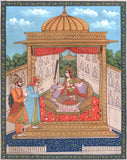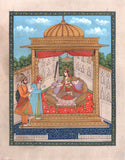Maharajah Ranjit Singh paying homage to the Devi
- Subject: Sikh Pahari Miniature Painting
- Paint Material: Opaque Watercolors
- Base Material: Paper (unframed)
- Size: 10.5 in. wide X 13 in. tall (27 cms X 33 cms)
- Age: Modern Handmade Art
- Country of origin: India
- Free Shipping Worldwide & No hassle return
Presenting a magnificent miniature masterpiece of Kangra-Pahari mixed style, representing the illustrious Sikh ruler Maharaja Ranjit Singh worshipping Devi.
Kangra painting is the pictorial art of Kangra, named after Kangra, Himachal Pradesh, India, a former princely state, which patronized the art. Pahari paintings, as the name suggests, were paintings executed in the hilly regions of India, in the sub-Himalayan state of Himachal Pradesh. It is in the development and modification of Pahari paintings, that the Kangra School features. Kangra paintings belong to the school of Pahari paintings that were patronized by the Rajput rulers between the 17th and 19th centuries.
This rich-looking art is not necessarily recording a specific visit of the maharajah to the Devi's temple: it is reconstructing one. Just outside the chamber in which the Devi (Indian Goddess) sits, in her resplendent glory - cross-legged on a golden throne, four armed, carrying a khadga (sword) and a pasha (noose), nimbus behind the head and parasol over it - stands the old maharajah with a young prince behind him. Both royal figures are seen with hands folded, the maharajah bending his head in obeisance. A certain feeling comes across: for, quite clearly, the art has rendered the Goddess's hands meaningfully, in the gesture of granting a boon or protection.
The work has a decided measure of richness, even if everything about it - clean, fluent line, sumptuousness coloring, and meticulous detailing of ornamental elements - is predictable.
The original art was done in the sikh/pahari style in the family workshop of Nainsukh of Guler in late 18th century India and currently resides in the National Museum, New Delhi, India.
Don’t miss out on this exclusive Pahari/Sikh miniature artwork. Buy it today.







